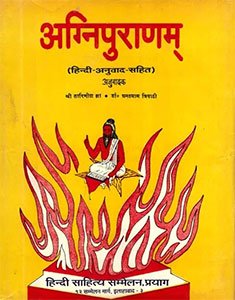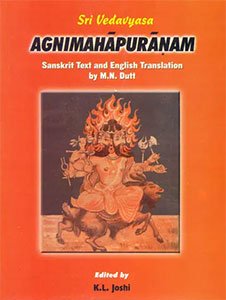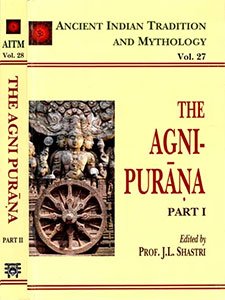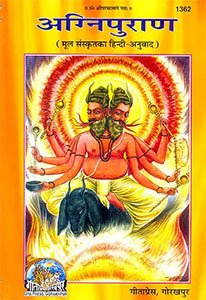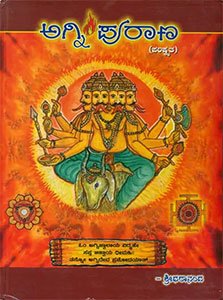Agni Purana [sanskrit]
97,288 words
This Sanskrit edition of the Agnipurana. It is one of the traditional eighteen Mahapuranas presented as an encyclopedia of ancient Indian history and knowledge. It contains either 382 or 383 chapters and over 10.000 verses (Sanskrit Shlokas).
Verse 147.1
ईश्वर उवाच । ओं गुह्यकुब्जिके हुं फट्मम सर्वोपद्रवान् यन्त्रमन्त्रतन्त्रचूर्णप्रयोगादिकं येन कृतं कारितं कुरुते करिष्यति कारयिष्यति तान् सर्वान् हन २ दंष्ट्राकरालिनि ह्रैं ह्रीं हुं गुह्यकुब्जिकायै द्वाहा । ह्रौं ओं खे वों गुह्यकुब्जिकायै नमः ।
ह्रीं सर्वजनक्षोभणी जनानुकर्षिणी ततः ।
ओं खें ख्यां सर्वजनवशङ्करी तथा स्याज्जनमोहिनी ॥ १ ॥
īśvara uvāca | oṃ guhyakubjike huṃ phaṭmama sarvopadravān yantramantratantracūrṇaprayogādikaṃ yena kṛtaṃ kāritaṃ kurute kariṣyati kārayiṣyati tān sarvān hana 2 daṃṣṭrākarālini hraiṃ hrīṃ huṃ guhyakubjikāyai dvāhā | hrauṃ oṃ khe voṃ guhyakubjikāyai namaḥ |
hrīṃ sarvajanakṣobhaṇī janānukarṣiṇī tataḥ |
oṃ kheṃ khyāṃ sarvajanavaśaṅkarī tathā syājjanamohinī || 1 ||
The Sanskrit text of Verse 147.1 is contained in the book The Agni Puranam (Anandashram Edition) by Shri Chimna Apate (श्री चिमणा आपटे). This book is available online or you could buy the latest edition:
Read online Buy now! The Sanskrit text by Shri Chimna Apate (श्री चिमणा आपटे) (1987)
Glossary of Sanskrit terms
Note: This extracts Sanskrit terms and links to English definitions from the glossary, based on an experimental segmentation of verse (147.1). Some terms could be superfluous while some might not be mentioned. Click on the word to show English definitions.
Ishvara, Guhyakubjika, Hum, Phat, Asmad, Sarvopadrava, Yantra, Antra, Tantra, Curna, Prayoga, Adika, Yena, Yah, Yat, Krit, Krita, Karita, Kuruta, Karishyat, Karayishyat, Sarva, Damshtri, Damshtra, Karalin, Karalini, Hrim, Dva, Ahar, Hraum, Kha, Nama, Namas, Sarvajana, Kshobhani, Jana, Anu, Karshini, Karshi, Karshin, Tatah, Tad, Tata, Shankari, Tatha,
Analysis of Sanskrit grammar
Note: this is an experimental feature and only shows the first possible analysis of the Sanskrit text (Verse 147.1). If the system was successful in segmenting the sentence, you will see of which words it is made up of, generally consisting of Nouns, Pronouns, Verbs, Participles and Indeclinables. Click on the link to show all possible derivations of the word.
- Line 1: “īśvara uvāca | oṃ guhyakubjike huṃ phaṭmama sarvopadravān yantramantratantracūrṇaprayogādikaṃ yena kṛtaṃ kāritaṃ kurute kariṣyati kārayiṣyati tān sarvān hana 2 daṃṣṭrākarālini hraiṃ hrīṃ huṃ guhyakubjikāyai dvāhā | hrauṃ oṃ khe voṃ guhyakubjikāyai namaḥ ”
- īśvara* -
-
īśvara (noun, masculine)[nominative single]
- uvāca -
-
√vac (verb class 2)[perfect active first single], [perfect active third single]√vac (verb class 3)[perfect active first single], [perfect active third single]
- Cannot analyse om*gu
- guhyakubjike -
-
guhyakubjikā (noun, feminine)[nominative dual], [vocative single], [vocative dual], [accusative dual]
- hum -
-
hum (indeclinable)[indeclinable]
- phaṭ -
-
phaṭ (indeclinable)[indeclinable]
- mama -
-
asmad (pronoun, none)[genitive single]√mā (verb class 2)[perfect active second plural]√mā (verb class 3)[perfect active second plural]√mā (verb class 4)[perfect active second plural]√mā (verb class 1)[perfect active second plural]
- sarvopadravān -
-
sarvopadrava (noun, masculine)[accusative plural]
- yantram -
-
yantra (noun, neuter)[adverb], [nominative single], [accusative single]
- antra -
-
antra (noun, neuter)[compound], [vocative single]
- tantra -
-
tantra (noun, neuter)[compound], [vocative single]
- cūrṇa -
-
cūrṇa (noun, masculine)[compound], [vocative single]cūrṇa (noun, neuter)[compound], [vocative single]
- prayogā -
-
prayoga (noun, masculine)[compound], [vocative single]prayoga (noun, neuter)[compound], [vocative single]prayogā (noun, feminine)[nominative single]
- adikam -
-
adika (noun, masculine)[adverb], [accusative single]adika (noun, neuter)[adverb], [nominative single], [accusative single]
- yena -
-
yena (indeclinable)[indeclinable]ya (noun, masculine)[instrumental single]yaḥ (pronoun, masculine)[instrumental single]yat (pronoun, neuter)[instrumental single]
- kṛtam -
-
kṛta (noun, masculine)[adverb], [accusative single]kṛta (noun, neuter)[adverb], [nominative single], [accusative single]kṛtā (noun, feminine)[adverb]kṛt (noun, masculine)[accusative single]√kṛ -> kṛta (participle, masculine)[accusative single from √kṛ class 1 verb], [accusative single from √kṛ class 2 verb], [accusative single from √kṛ class 5 verb], [accusative single from √kṛ class 8 verb]√kṛ -> kṛta (participle, neuter)[nominative single from √kṛ class 1 verb], [accusative single from √kṛ class 1 verb], [nominative single from √kṛ class 2 verb], [accusative single from √kṛ class 2 verb], [nominative single from √kṛ class 5 verb], [accusative single from √kṛ class 5 verb], [nominative single from √kṛ class 8 verb], [accusative single from √kṛ class 8 verb]√kṛ (verb class 2)[imperative active second dual]
- kāritam -
-
kārita (noun, masculine)[adverb], [accusative single]kārita (noun, neuter)[adverb], [nominative single], [accusative single]kāritā (noun, feminine)[adverb]√kṛ -> kārita (participle, masculine)[adverb from √kṛ]√kṛ -> kārita (participle, neuter)[adverb from √kṛ]√kṛ -> kāritā (participle, feminine)[adverb from √kṛ]√kṛ -> kārita (participle, masculine)[accusative single from √kṛ]√kṛ -> kārita (participle, neuter)[nominative single from √kṛ], [accusative single from √kṛ]
- kurute -
-
kurutā (noun, feminine)[nominative dual], [vocative single], [vocative dual], [accusative dual]kuruta (noun, masculine)[locative single]kuruta (noun, neuter)[nominative dual], [vocative dual], [accusative dual], [locative single]√kṛ (verb class 8)[present middle third single]
- kariṣyati -
-
kariṣyat (noun, masculine)[locative single]kariṣyat (noun, neuter)[locative single]√kṛ -> kariṣyat (participle, masculine)[locative single from √kṛ class 1 verb], [locative single from √kṛ class 2 verb], [locative single from √kṛ class 5 verb], [locative single from √kṛ class 8 verb]√kṛ -> kariṣyat (participle, neuter)[locative single from √kṛ class 1 verb], [locative single from √kṛ class 2 verb], [locative single from √kṛ class 5 verb], [locative single from √kṛ class 8 verb]√kṛ -> kariṣyat (participle, masculine)[locative single from √kṛ class 3 verb], [locative single from √kṛ class 6 verb]√kṛ -> kariṣyat (participle, neuter)[locative single from √kṛ class 3 verb], [locative single from √kṛ class 6 verb]√kṝ -> kariṣyat (participle, masculine)[locative single from √kṝ class 5 verb], [locative single from √kṝ class 9 verb]√kṝ -> kariṣyat (participle, neuter)[locative single from √kṝ class 5 verb], [locative single from √kṝ class 9 verb]√kṛ (verb class 1)[future active third single]√kṛ (verb class 2)[future active third single]√kṛ (verb class 5)[future active third single]√kṛ (verb class 8)[future active third single]√kṛ (verb class 3)[future active third single]√kṛ (verb class 6)[future active third single]√kṝ (verb class 5)[future active third single]√kṝ (verb class 9)[future active third single]
- kārayiṣyati -
-
√kṛ -> kārayiṣyat (participle, masculine)[locative single from √kṛ]√kṛ -> kārayiṣyat (participle, neuter)[locative single from √kṛ]√kṛ (verb class 0)[future active third single]
- tān -
-
ta (noun, masculine)[accusative plural]sa (noun, masculine)[accusative plural]
- sarvān -
-
sarva (noun, masculine)[accusative plural]
- hana* -
-
- Cannot analyse 2*da
- daṃṣṭrā -
-
daṃṣṭṛ (noun, masculine)[instrumental single]daṃṣṭrā (noun, feminine)[nominative single]
- karālini -
-
karālinī (noun, feminine)[adverb], [vocative single]karālin (noun, masculine)[locative single]karālin (noun, neuter)[locative single]
- Cannot analyse hraim*hr
- hrīm -
-
hrīm (indeclinable)[indeclinable]
- hum -
-
hum (indeclinable)[indeclinable]
- guhyakubjikāyai -
-
guhyakubjikā (noun, feminine)[dative single]
- dvā -
-
dva (noun, masculine)[compound], [vocative single]dva (noun, neuter)[compound], [vocative single]dvā (noun, feminine)[nominative single]
- ahā* -
-
ahar (noun, neuter)[nominative single], [vocative single], [accusative single]√hā (verb class 1)[imperfect active second single], [aorist active second single]√hā (verb class 3)[aorist active second single]
- hraum -
-
hraum (indeclinable)[indeclinable]
- Cannot analyse om*kh
- khe -
-
kha (noun, masculine)[locative single]kha (noun, neuter)[nominative dual], [vocative dual], [accusative dual], [locative single]khā (noun, feminine)[nominative dual], [vocative single], [vocative dual], [accusative dual]
- vo -
-
vā (indeclinable conjunction)[indeclinable conjunction]va (noun, masculine)[compound], [vocative single]va (noun, neuter)[compound], [vocative single]vā (noun, feminine)[nominative single]√vā (verb class 1)[imperative active second single]
- um -
-
u (noun, masculine)[accusative single]
- guhyakubjikāyai -
-
guhyakubjikā (noun, feminine)[dative single]
- namaḥ -
-
namas (noun, masculine)[compound], [vocative single]namas (noun, neuter)[compound], [nominative single], [vocative single], [accusative single]nama (noun, masculine)[nominative single]
- Line 2: “hrīṃ sarvajanakṣobhaṇī janānukarṣiṇī tataḥ ”
- hrīm -
-
hrīm (indeclinable)[indeclinable]
- sarvajana -
-
sarvajana (noun, masculine)[compound], [vocative single]
- kṣobhaṇī -
-
kṣobhaṇī (noun, masculine)[compound]kṣobhaṇī (noun, feminine)[compound], [nominative single]
- janā -
-
jana (noun, masculine)[compound], [vocative single]jana (noun, neuter)[compound], [vocative single]janā (noun, feminine)[nominative single]√jan (verb class 1)[imperative active second single]
- anu -
-
anu (indeclinable adverb)[indeclinable adverb]anu (indeclinable preposition)[indeclinable preposition]anu (noun, masculine)[compound], [adverb]anu (noun, neuter)[compound], [adverb], [nominative single], [vocative single], [accusative single]anu (noun, feminine)[compound], [adverb]
- karṣiṇī -
-
karṣiṇī (noun, feminine)[compound], [nominative single]karṣi (noun, neuter)[nominative dual], [vocative dual], [accusative dual]karṣin (noun, neuter)[nominative dual], [vocative dual], [accusative dual]
- tataḥ -
-
tataḥ (indeclinable adverb)[indeclinable adverb]tataḥ (indeclinable correlative)[indeclinable correlative]tataḥ (indeclinable)[indeclinable]tad (noun, neuter)[ablative single], [ablative dual], [ablative plural]tata (noun, masculine)[nominative single]√tan -> tata (participle, masculine)[nominative single from √tan class 8 verb]sa (noun, masculine)[ablative single], [ablative dual], [ablative plural]sā (noun, feminine)[ablative single], [ablative dual], [ablative plural]
- Line 3: “oṃ kheṃ khyāṃ sarvajanavaśaṅkarī tathā syājjanamohinī ”
- Cannot analyse om*kh
- khe -
-
kha (noun, masculine)[compound], [vocative single], [locative single]kha (noun, neuter)[compound], [nominative dual], [vocative single], [vocative dual], [accusative dual], [locative single]khā (noun, feminine)[nominative single], [nominative dual], [vocative single], [vocative dual], [accusative dual]
- im -
-
i (noun, masculine)[accusative single]
- Cannot analyse khyām*sa
- sarvajana -
-
sarvajana (noun, masculine)[compound], [vocative single]
- va -
-
va (noun, masculine)[compound], [vocative single]va (noun, neuter)[compound], [vocative single]
- śaṅkarī -
-
śaṅkarī (noun, feminine)[compound], [nominative single]śaṅkarī (noun, masculine)[compound]
- tathā -
-
tathā (indeclinable correlative)[indeclinable correlative]tathā (indeclinable)[indeclinable]tathā (noun, feminine)[nominative single]
- Cannot analyse syājjanamohinī
Other editions:
Also see the following editions of the Sanskrit text or (alternative) English translations of the Verse 147.1
Agni Purana with Hindi Translation
by Tarinish Jha and Dr. Ghanshayam Tripathi (तारिणीश् झा और डॉ. घनश्याम त्रिपाठी) (2007)
Publisher: Hindi Sahitya Sammelan, Allahabad; 1199 pages; Title: अग्निपुराणम् (संस्कृत एवं हिन्दी अनुवाद);
Buy now!
Agni Purana (Two Volumes)
by M. N. Dutt (2023)
Publisher: Parimal Publication Pvt. Ltd.; Editor: K. L. Joshi.; ISBN-10: 8171101690; ISBN-13: 9788171101696; 1070 pages.
Buy now!
Agni-Purana (Set of 4 Volumes)
by N. Gangadharan (2006)
Publisher: Motilal Banarsidass Publishers Pvt. Ltd.; ISBN: Part I 8120803590 (9788120803596); Part II 8120803604 (9788120803602); Part III 8120801741 (9788120801745); Part IV 812080306X (9788120803060); 1271 pages.
Buy now!
The Agni Purana (Hindi)
by (2013)
Publisher: Gita Press, Gorakhpur; Title: अग्निपुराण (केवल हिन्दी अनुवाद); ISBN-10: 8129302934; ISBN-13: 9788129302939; 848 pages.
Buy now!
Agni Purana (Kannada)
by Sreedharananda (2013)
Publisher: Pooja Pusthaka Bhandara, Bangalore; Title: ಅಗ್ನಿ ಪುರಾಣ; 560 pages.
Buy now!Preview of verse 147.1 in Kannada sript:
ಈಶ್ವರ ಉವಾಚ । ಓಂ ಗುಹ್ಯಕುಬ್ಜಿಕೇ ಹುಂ ಫಟ್ಮಮ ಸರ್ವೋಪದ್ರವಾನ್ ಯನ್ತ್ರಮನ್ತ್ರತನ್ತ್ರಚೂರ್ಣಪ್ರಯೋಗಾದಿಕಂ ಯೇನ ಕೃತಂ ಕಾರಿತಂ ಕುರುತೇ ಕರಿಷ್ಯತಿ ಕಾರಯಿಷ್ಯತಿ ತಾನ್ ಸರ್ವಾನ್ ಹನ ೨ ದಂಷ್ಟ್ರಾಕರಾಲಿನಿ ಹ್ರೈಂ ಹ್ರೀಂ ಹುಂ ಗುಹ್ಯಕುಬ್ಜಿಕಾಯೈ ದ್ವಾಹಾ । ಹ್ರೌಂ ಓಂ ಖೇ ವೋಂ ಗುಹ್ಯಕುಬ್ಜಿಕಾಯೈ ನಮಃ ।
ಹ್ರೀಂ ಸರ್ವಜನಕ್ಷೋಭಣೀ ಜನಾನುಕರ್ಷಿಣೀ ತತಃ ।
ಓಂ ಖೇಂ ಖ್ಯಾಂ ಸರ್ವಜನವಶಙ್ಕರೀ ತಥಾ ಸ್ಯಾಜ್ಜನಮೋಹಿನೀ ॥ ೧ ॥
![Agni Purana [sanskrit] - book cover](/uploads/a/Agni-Purana-Sanskrit.jpg)
